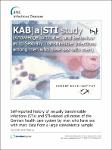Self-reported history of sexually transmissible infections (STIs) and STI-related utilization of the German health care system by men who have sex with men: data from a large convenience sample
Schmidt, Axel J.
Marcus, Ulrich
Background:In Germany, testing and treatment of sexually transmissible infections (STIs) services are not provided by one medical discipline, but rather dispersed among many different providers. Common STIs like gonorrhoea or Chlamydia infection are not routinely reported. Although men who have sex with men (MSM) are particularly vulnerable to STIs, respective health care utilization among MSM is largely unknown. Methods: A sexual behaviour survey among MSM was conducted in 2006. Questions on self-reported sexual behaviour, STI-related health care consultation and barriers to access, coverage of vaccination against hepatitis, screening for asymptomatic STIs, self-reported history of STIs, and partner notification were analysed. Analysis was stratified by HIV-serostatus (3,511 HIV-negative/unknown versus 874 positive). Results: General Practitioners, particularly gay doctors, were preferred for STI-related health care. Low threshold testing in sex-associated venues was acceptable for most respondents. Shame and fear of homophobic reactions were the main barriers for STI-testing. More than half of the respondents reported vaccination against hepatitis A/B. HIV-positive MSM reported screening offers for STIs three to seven times more often than HIV-negative or untested MSM. Unlike testing for syphilis or hepatitis C, screening for asymptomatic pharyngeal and rectal infections was rarely offered. STIs in the previous twelve months were reported by 7.1% of HIV-negative/untested, and 34.7% of HIV-positive respondents. Conclusions: Self-reported histories of STIs in MSM convenience samples differ significantly by HIV-serostatus. Higher rates of STIs among HIV-positive MSM may partly be explained by more testing. Communication between health care providers and their clients about sexuality, sexual practices, and sexual risks should be improved. A comprehensive STI screening policy for MSM is needed.
No license information

